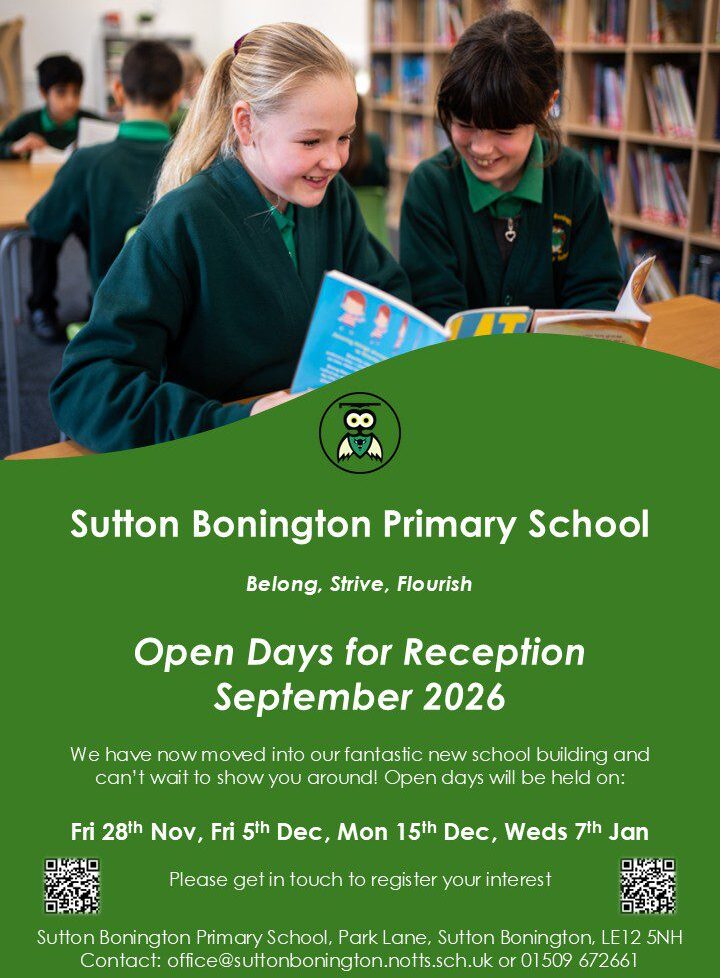Curriculum Intent
At Sutton Bonington Primary School, Religious Education (RE) is integral to fostering understanding and respect for diverse beliefs and worldviews. Our curriculum encourages children to explore a variety of religious and non-religious perspectives, promoting empathy, critical thinking, and moral, social, and cultural awareness.
Through the study of major world religions – Christianity, Judaism, Islam, Sikhism, Hinduism, and Buddhism – we aim for pupils to develop a sound knowledge and understanding of different faiths and practices. This supports their understanding of fundamental British Values, including acceptance and respect for others who hold differing worldviews. We also aim for them to develop their understanding of the disciplinary concepts of believing, thinking and living.
We aim to nurture thoughtful and informed individuals who appreciate the richness of religious and cultural diversity, preparing them to engage positively with the wider world. RE at Sutton Bonington provides a foundation for pupils to reflect on their own beliefs while fostering a respectful and inclusive school community.
Our curriculum intent is in line with the requirements of the Locally Agreed RE Syllabus for Nottinghamshire.
Curriculum Implementation
At Sutton Bonington Primary School, Religious Education (RE) is carefully planned and delivered to ensure pupils develop a deep understanding of a range of faiths and worldviews. Our curriculum is meticulously sequenced, ensuring that knowledge is built upon year by year, enabling pupils to make meaningful connections between topics and deepen their understanding over time. Each year group engages with six RE units across the academic year, with one unit taught per half term. Lessons are delivered once per week, providing consistent opportunities for reflection, discussion, and skill development.
To celebrate and consolidate learning, children’s written work and photographs are displayed in class ‘floor books,’ creating a shared space that showcases progress, creativity, and understanding across units.
We enrich the RE curriculum through a variety of engaging opportunities. Across their school journey, children visit three different places of worship: one in Key Stage 1, one in Lower Key Stage 2, and one in Upper Key Stage 2. These visits allow pupils to experience religious practices and communities firsthand, fostering respect and empathy. In addition, we welcome visitors from different faith backgrounds who share their traditions and beliefs. Pupils also participate in regular religious assemblies, as well as visits to the local churches.
In the Early Years Foundation Stage, RE is designed to introduce children to foundational concepts of religion and self-awareness. Children in Reception experience the RE curriculum through the ‘People, Culture and Communities’ early learning goal. Pupils explore themes such as how they are special, religious celebrations, and stories and parables from the Bible, laying the groundwork for further learning.
Adaptations for children with special educational needs and disabilities are made in line with our SEND Curriculum Adaptations document. These may include the use of additional scaffolding, explicit instruction, cognitive and metacognitive strategies, flexible groupings and use of specific resources or technology.
Opportunities for children’s spiritual, moral, social and cultural development through RE are also explored where appropriate. Our RE curriculum not only helps pupils gain knowledge about world religions but also promotes critical thinking, respect, and an appreciation for diversity, ensuring children are well-prepared to engage positively in our multicultural society. Through meaningful lessons, enrichment opportunities, and a well-structured approach, RE at Sutton Bonington is a cornerstone of our inclusive and values-driven ethos.
Curriculum Impact
Through the explicit teaching of the Religious Education curriculum, teachers and pupils assess their learning throughout the lesson (AFL). Within the projects, pupils consider evaluative questions which provides opportunities for them to build a schema of connections of concepts and knowledge which they can retrieve throughout their continued learning journey in religious education. We hope pupils will be encouraged to undertake research independently to further their own enjoyment across a range of religious education topics. The main desired impact of teaching RE is that we send our learners out into the world with an understanding of the diversity of beliefs, practices, lifestyles and values which exist in our multi-cultural society.
We assess the impact of our curriculum through examining children’s work, talking with and questioning children as well as making observations and setting specific tasks. Teacher assessment is ongoing throughout the year with a formal summative assessment made and recorded at the end of the summer term.


